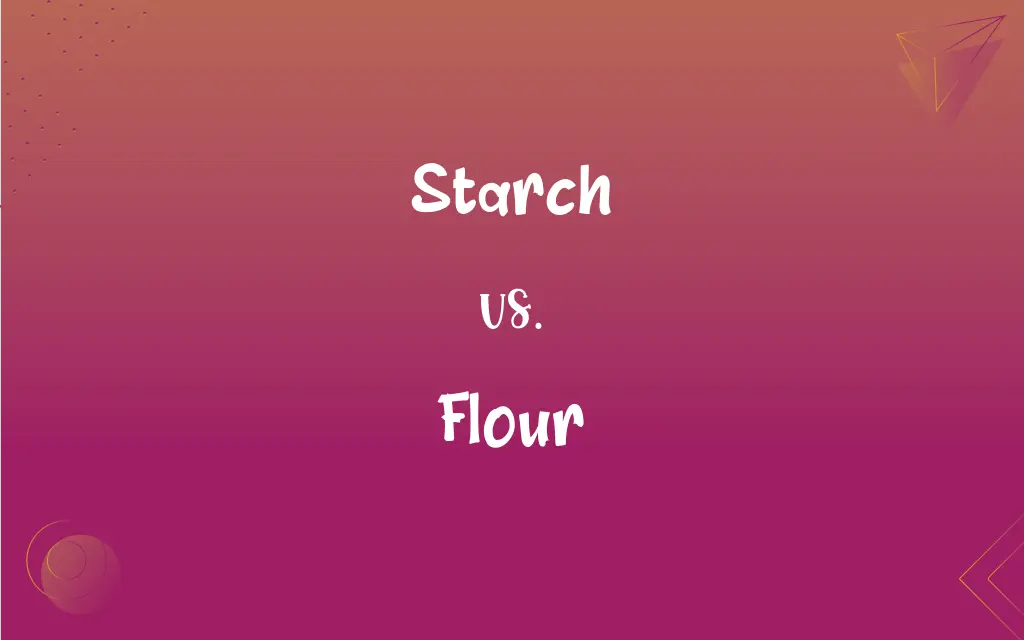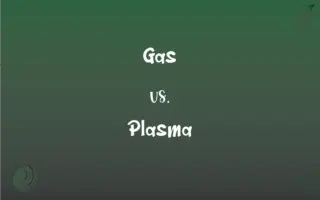Starch vs. Flour: What's the Difference?
Edited by Harlon Moss || By Janet White || Published on December 1, 2023
Starch is a carbohydrate found in many plants, used as a thickening agent in cooking, while flour is a powder made by grinding raw grains or other seeds or roots.

Key Differences
Starch is a polysaccharide carbohydrate consisting of a large number of glucose units, primarily found in plants. Flour, on the other hand, is a powder obtained by grinding grains, nuts, seeds, or roots, and contains starch as one of its components.
The primary use of starch in cooking is as a thickening agent for sauces, soups, and gravies. Flour is used more diversely, serving as a key ingredient in baking bread, cakes, and pastries, and also as a thickener.
Starches are extracted from sources like corn, potatoes, and rice, and are relatively flavorless. Flours can be derived from a variety of grains like wheat, barley, and rye, each imparting a unique flavor and texture to dishes.
In terms of nutritional value, pure starch is almost entirely carbohydrate, while flour contains proteins (like gluten in wheat flour), fiber, and other nutrients depending on the source grain.
All flours contain starch, while not all starch is derived from flour; for example, cornstarch is a refined product specifically made from the starchy part of corn kernels.
ADVERTISEMENT
Comparison Chart
Definition
A carbohydrate used mainly as a thickening agent.
A powder made from ground grains, seeds, or roots, used for baking and cooking.
Source
Extracted from plants, primarily from their roots or seeds.
Ground grains, nuts, seeds, or roots.
Primary Use in Cooking
Thickening agent for sauces, soups, and gravies.
Base ingredient in baking, coating, and thickening.
Flavor
Generally flavorless.
Varied flavors depending on the grain or source used.
Nutritional Content
Mostly carbohydrates with minimal other nutrients.
Contains carbohydrates, proteins, fibers, and other nutrients.
ADVERTISEMENT
Starch and Flour Definitions
Starch
Starch can be used in non-food products like adhesives and paper.
Starch is used in the production of eco-friendly packaging.
Flour
A powder made by grinding raw grains, used for baking.
She used wheat flour to make the bread.
Starch
A carbohydrate used as a thickening agent in cooking.
She used potato starch to thicken the soup.
Flour
Flour can be made from a variety of grains and seeds.
Almond flour is a popular gluten-free option.
Starch
An essential energy source in the human diet.
Rice is a good source of starch.
Flour
In non-culinary terms, to 'flour' means to sprinkle or coat with flour.
Flour the surface before rolling the dough.
Starch
A fine, white powder extracted from plants.
Cornstarch is commonly used in baking and cooking.
Flour
An essential ingredient in many culinary recipes.
Flour is indispensable in cake recipes.
Starch
Starch can refer to a stiff, formal demeanor.
His starch demeanor was intimidating.
Flour
Flour is used as a thickening agent in cooking.
He used flour to thicken the gravy.
Starch
A naturally abundant nutrient carbohydrate, (C6H10O5)n, found chiefly in the seeds, fruits, tubers, roots, and stem pith of plants, notably in corn, potatoes, wheat, and rice, and varying widely in appearance according to source but commonly prepared as a white amorphous tasteless powder.
Flour
A fine, powdery foodstuff obtained by grinding and sifting the meal of a grain, especially wheat, used chiefly in baking.
Starch
Any of various substances, such as natural starch, used to stiffen cloth, as in laundering.
Flour
Any of various similar finely ground or powdered foodstuffs, as of cassava, chickpeas, or bananas.
FAQs
Is starch digestible?
Yes, most starches are digestible and a source of energy.
Where is starch commonly found?
It's commonly found in foods like potatoes, rice, and corn.
Can starch be used in cooking?
Yes, it's often used as a thickening agent in sauces and soups.
What is starch?
Starch is a carbohydrate found in many plants, used for energy storage.
What is resistant starch?
Resistant starch resists digestion, acting like fiber in the digestive system.
What's the difference between starch and cellulose?
Starch is a storage carbohydrate, while cellulose is a structural carbohydrate in plants.
Can starch be used in gluten-free baking?
Yes, it's a common ingredient in gluten-free recipes.
What is flour?
Flour is a powder made by grinding raw grains, seeds, or roots.
What are common types of flour?
Common types include wheat, almond, coconut, and rice flour.
How does starch impact blood sugar?
Starch can cause blood sugar levels to rise, depending on its type.
Can flour be gluten-free?
Some flours, like rice or almond flour, are naturally gluten-free.
How is flour used in baking?
It's a fundamental ingredient in bread, cakes, and pastries.
Does flour expire?
Flour can expire and develop a rancid taste over time.
How should flour be stored?
Store it in a cool, dry place, preferably in an airtight container.
Is starch gluten-free?
Pure starch is gluten-free, but cross-contamination can occur.
What is the difference between whole wheat and white flour?
Whole wheat flour includes the entire grain, while white flour is more refined.
Is flour suitable for a keto diet?
Traditional wheat flour isn't, but almond or coconut flour can be keto-friendly.
Can flour be made from nuts?
Yes, almond and coconut flours are popular nut-based flours.
Is starch vegan?
Pure starch is vegan as it's derived from plants.
Is flour a carbohydrate?
Yes, flour is primarily composed of carbohydrates.
About Author
Written by
Janet WhiteJanet White has been an esteemed writer and blogger for Difference Wiki. Holding a Master's degree in Science and Medical Journalism from the prestigious Boston University, she has consistently demonstrated her expertise and passion for her field. When she's not immersed in her work, Janet relishes her time exercising, delving into a good book, and cherishing moments with friends and family.
Edited by
Harlon MossHarlon is a seasoned quality moderator and accomplished content writer for Difference Wiki. An alumnus of the prestigious University of California, he earned his degree in Computer Science. Leveraging his academic background, Harlon brings a meticulous and informed perspective to his work, ensuring content accuracy and excellence.






































































